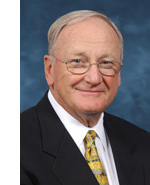The Bo Schembechler Legacy
 Glenn Edward Schembechler, Jr., was born and raised in the Akron suburb of Barberton, Ohio. His sister’s early attempts to pronounce “brother” resulted in one of the most recognizable nicknames in the history of sports—one that warmed the hearts of his fans while striking fear in those of his opponents: Bo. Glenn Edward Schembechler, Jr., was born and raised in the Akron suburb of Barberton, Ohio. His sister’s early attempts to pronounce “brother” resulted in one of the most recognizable nicknames in the history of sports—one that warmed the hearts of his fans while striking fear in those of his opponents: Bo.
While attending Miami University in Oxford, Ohio, Bo played tackle under two legendary coaches, Sid Gillman and Woody Hayes, the latter playing a key role in his life on and off the field for more than 30 years. Upon graduating in 1951, Bo followed Hayes to Ohio State University, earning his master’s degree while working as a graduate assistant coach under his mentor. Following a tour of duty in the Army, Bo further honed his coaching skills and style of play in assistant coaching positions at Presbyterian College, Bowling Green University, and Northwestern University, returning to coach under Hayes again at OSU in 1958 before assuming his first head-coaching position at his alma mater, Miami of Ohio, in 1963.
Bo made the move from Oxford to Ann Arbor five years later, becoming Michigan’s 15th head coach prior to the 1969 season. Legend has it that he was hired in just 15 minutes—the time it took for athletic director Don Canham to measure “the intensity and enthusiasm of a man destined to be a winner.”
Never a losing season
 How right Canham was. In his 27 years of coaching, Bo Schembechler’s teams never had a losing season. His career record of 234 wins, 65 losses and eight ties included 21 winning seasons as head coach at Michigan, leading the Wolverines to 13 Big Ten championships and 17 post-season bowl games, including ten trips to the Rose Bowl. Bo retired in 1989 with more wins than any other Michigan coach, and to this day ranks as the fifth most winning coach in the history of college football. How right Canham was. In his 27 years of coaching, Bo Schembechler’s teams never had a losing season. His career record of 234 wins, 65 losses and eight ties included 21 winning seasons as head coach at Michigan, leading the Wolverines to 13 Big Ten championships and 17 post-season bowl games, including ten trips to the Rose Bowl. Bo retired in 1989 with more wins than any other Michigan coach, and to this day ranks as the fifth most winning coach in the history of college football.
A 40-year battle with heart disease
In Bo, beat the heart of a champion. But for more than four decades, that same heart was to prove a more formidable foe than any he would meet on the field. He suffered his first heart attack the night before his Rose Bowl debut, New Year’s Eve 1969. A successful quadruple bypass operation was performed on Bo in 1976, with a second in 1987, following his second heart attack.
 His was a battle fought in the public eye and in close partnership with another winning team—first, the cardiologists and cardiac surgeons at St. Joseph Mercy Ann Arbor, led by Dr. Rudy Reichert and Dr. Otto Gago, followed by the cardiovascular experts at U-M, led by Dr. Kim Eagle. Throughout the journey, Bo was a walking, talking testament to the role scientific advances could play in helping cardiac patients live longer, healthier lives. His was a battle fought in the public eye and in close partnership with another winning team—first, the cardiologists and cardiac surgeons at St. Joseph Mercy Ann Arbor, led by Dr. Rudy Reichert and Dr. Otto Gago, followed by the cardiovascular experts at U-M, led by Dr. Kim Eagle. Throughout the journey, Bo was a walking, talking testament to the role scientific advances could play in helping cardiac patients live longer, healthier lives.
Bo Schembechler’s steadfast support of cardiovascular research was taken to a new level in early 2006 when, along with his wife Cathy, he established the Bo Schembechler Heart of a Champion Research Fund. On November 17 of that year, on the eve of the Michigan-Ohio State game, his champion’s heart beat for the last time. But thanks to the Heart of a Champion Fund, his remarkable legacy lives on and his vision for cardiovascular research is supported.
|


 Glenn Edward Schembechler, Jr., was born and raised in the Akron suburb of Barberton, Ohio. His sister’s early attempts to pronounce “brother” resulted in one of the most recognizable nicknames in the history of sports—one that warmed the hearts of his fans while striking fear in those of his opponents: Bo.
Glenn Edward Schembechler, Jr., was born and raised in the Akron suburb of Barberton, Ohio. His sister’s early attempts to pronounce “brother” resulted in one of the most recognizable nicknames in the history of sports—one that warmed the hearts of his fans while striking fear in those of his opponents: Bo.  How right Canham was. In his 27 years of coaching, Bo Schembechler’s teams never had a losing season. His career record of 234 wins, 65 losses and eight ties included 21 winning seasons as head coach at Michigan, leading the Wolverines to 13 Big Ten championships and 17 post-season bowl games, including ten trips to the Rose Bowl. Bo retired in 1989 with more wins than any other Michigan coach, and to this day ranks as the fifth most winning coach in the history of college football.
How right Canham was. In his 27 years of coaching, Bo Schembechler’s teams never had a losing season. His career record of 234 wins, 65 losses and eight ties included 21 winning seasons as head coach at Michigan, leading the Wolverines to 13 Big Ten championships and 17 post-season bowl games, including ten trips to the Rose Bowl. Bo retired in 1989 with more wins than any other Michigan coach, and to this day ranks as the fifth most winning coach in the history of college football. His was a battle fought in the public eye and in close partnership with another winning team—first, the cardiologists and cardiac surgeons at St. Joseph Mercy Ann Arbor, led by Dr. Rudy Reichert and Dr. Otto Gago, followed by the cardiovascular experts at U-M, led by Dr. Kim Eagle. Throughout the journey, Bo was a walking, talking testament to the role scientific advances could play in helping cardiac patients live longer, healthier lives.
His was a battle fought in the public eye and in close partnership with another winning team—first, the cardiologists and cardiac surgeons at St. Joseph Mercy Ann Arbor, led by Dr. Rudy Reichert and Dr. Otto Gago, followed by the cardiovascular experts at U-M, led by Dr. Kim Eagle. Throughout the journey, Bo was a walking, talking testament to the role scientific advances could play in helping cardiac patients live longer, healthier lives.